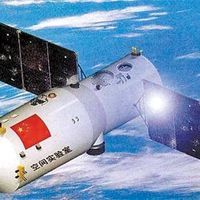News Center
China set to launch more livable space lab in Q3
April 22, 2016
Source: Xinhua 2016-04-21 20:47:25

BEIJING, April 21 (Xinhua) -- China will put the country's second space lab Tiangong-2 into space in the third quarter of this year with more livable conditions for astronauts, a spokesman said here Thursday.
According to Wang Zhongyang, spokesman with the China Academy of Space Technology (CAST), the new space lab will consist of a hermetically sealed experiment cabin, designed to provide astronauts with clean air and suitable temperature and humidity, and a resource module featuring solar wings, batteries and propellant for thrusters.
"We have specifically modified the interior of the new space lab to make it more livable for mid-term stays for our astronauts," Wang said ahead of the country's Space Day on April 24, set to mark the launch of China's first satellite 46 years ago.
Tiangong-2 is China's second space lab designed to carry out space science experiments and repair tests to pave way for the country's first orbital space station which is expected to be in service around 2022.
Tiangong-1, launched in September 2011 with an initial design life of two years, just ended its data service earlier this year after an operational orbit of 1,630 days during which it docked with the Shenzhou-8, Shenzhou-9 and Shenzhou-10 spacecraft and undertook a series of experiments.
"Unlike Tiangong-1, Tiangong-2 will be our first genuine space lab," said Wang.
Earlier reports said Tiangong-2 will dock with the Shenzhou-11 spacecraft, which is expected to blast off in the fourth quarter and carry two male Chinese astronauts for a 30-day mission in the new space lab before returning to Earth.
The astronauts are currently receiving training.
In 2017, Tiangong-2 will dock with China's first space cargo ship Tianzhou-1, which will be launched in the first half of next year on top of a next generation Long March-7 rocket. Scientists will verify key technologies such as propellant refueling while in orbit during the process.
China's multi-billion-dollar space endeavors have become a source of surging national pride and a milestone of China's global stature and technical expertise.
The country sent its first astronaut into space in 2003, the third nation after Russia and the United States to achieve manned space travel independently. In 2008, astronauts aboard Shenzhou-7 made China's first space walk.
